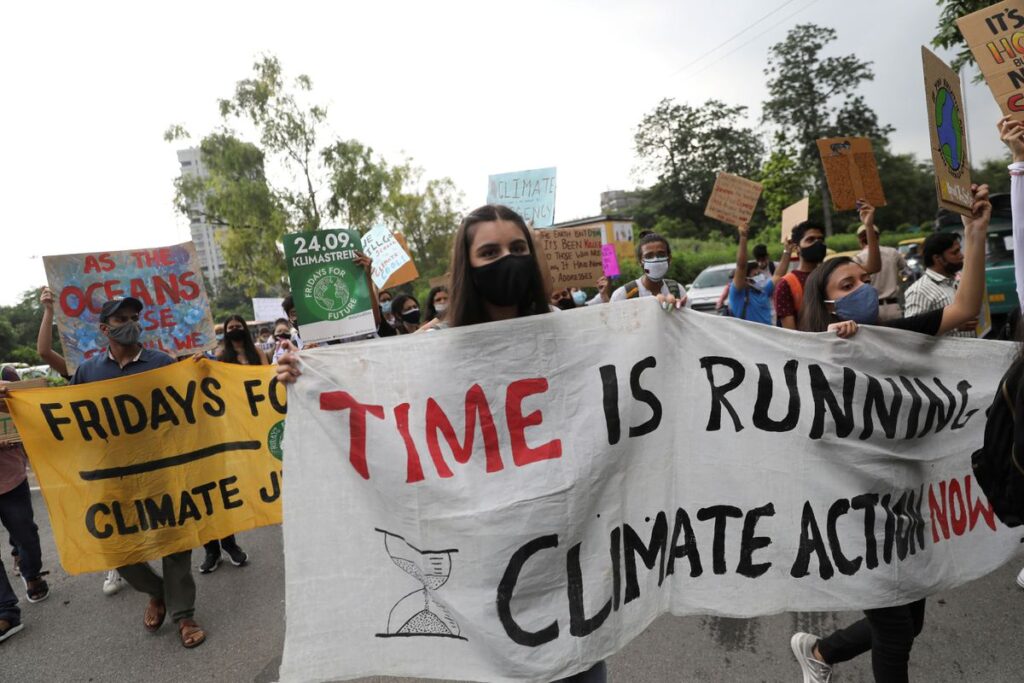Climate Adaptation Must Be Transformational, Not Just Fighting Fires
Dec 14, 2022 | Pratirodh Bureau
FILE PHOTO: People hold banners and signs as they take part in a march calling for urgent measures to combat climate change, in New Delhi (Reuters)
There was significant progress on finance for climate adaptation at COP27 last month. Governments agreed to move forward on the Global Goal on Adaptation established in the 2015 Paris Agreement, which seeks to improve the resilience of the world’s most vulnerable people to the impacts of climate change. New pledges of USD 230 million were made to the Adaptation Fund – a fund set up by the UN system in 2001 to generate financial support for countries in adapting to climate change, but for which funding pledges were not kept to. And UN Climate Change’s Standing Committee on Finance was tasked with preparing a report on doubling adaptation finance, which will be considered at COP28.
And yet these pledges pale in comparison with the costs of disasters already being borne. India alone suffered USD 87 billion of losses in 2020 due to extreme weather events, made more likely by climate change, according to the World Meteorological Organization. Additionally, the full extent of what climate change might actually entail – the magnitude of impacts, and the direct and the cascading impacts – is not well understood or known.
The Costs Of Climate Change
According to a 2018 report by the World Bank, by 2050 the impacts of climate change could cost India 2.8% of its GDP per capita and depress the living standards of nearly half the country’s population. The report also estimates that approximately 600 million people live in parts of India that could become moderate or severe hotspots – defined as areas where people’s spending on consumption declines by 4-8%, or more than 8%, respectively – by 2050. The flurry of intense climate hazards seen in the past few decades threatens water security, agricultural productivity, ecosystems and urban infrastructure, among others.
This year, the International Food Policy Research Institute warned that climate change may push many Indians into hunger by 2030 due to a decline in agricultural production and disruption in the food supply chain. Meanwhile, the World Meteorological Organization last year stated that sea levels along almost the entire Indian coast are rising faster than the global average. It is not just a threat to lives that looms large, but livelihoods. In 2019, the International Labour Organization projected that inaction in the face of slow-onset events like heatwaves will cost India 34 million jobs by 2030.
Adaptation In Its Current Form Is Inadequate
While adaptation to climate change is happening, it is uneven, incremental and small-scale, according to the UN Environment Programme’s Adaptation Gap report.
Further, adaptation action in silos might do more harm than good by redistributing risks to other sectors or even exacerbating them. This is already the case with crop losses due to climate disasters. Crop losses trigger price hikes, prompting a ban on the export of these crops to insulate domestic markets. In turn, this creates a cascading crisis in the global markets. Thus, adaptation in one sector could spell disaster for another, if the actions are uncoordinated and implemented to protect narrow self-interests.
With the impacts of climate change becoming more severe and frequent, adaptation needs to move beyond incremental, localised efforts to become transformational. This is possible only if adaptation actions consider climate risks, and look not just at short-term gains and adjustments at a sectoral level, but at the long term and the big picture.
A Systemic Approach To Climate Adaptation
Understanding the impacts of climate change at the sectoral level – on agriculture, water, forests, coasts, urban infrastructure and vulnerable communities – is important to evaluate adaptation needs, and to mobilise action at the local level. However, recognising the interconnections between sectors is needed to avoid maladaptation. For instance, constructing check dams upstream for water harvesting without considering the entire watershed can lead to water scarcity for people living downstream, which in turn can impact agriculture and food security.
Currently, much climate adaptation is essentially firefighting, in that it considers only the immediate risks. There is a lack of explicit climate risk-informed adaptation that comprehensively considers hazards, exposure, and vulnerabilities and the response. Additionally, metrics to measure the impact and attribute it to climate change are still evolving. And finally, metrics to track the impact of dedicated adaptation efforts or adaptation co-benefits of development activities, if any, are lacking.
For adaptation measures to work efficiently, assessments of capacity, technology and financial needs should be integrated. Regional (national and sub-national) stocktakes should now be initiated to move forward with the Global Goal on Adaptation.
Going forward, the pooling of investments targeted at delivering systemic resilience, rather than piecemeal adaptation, through international cooperation is the only way public goods and services can be protected. This may help improve resilience for the hundreds of millions of people who will be more vulnerable to climate impacts by 2050.
